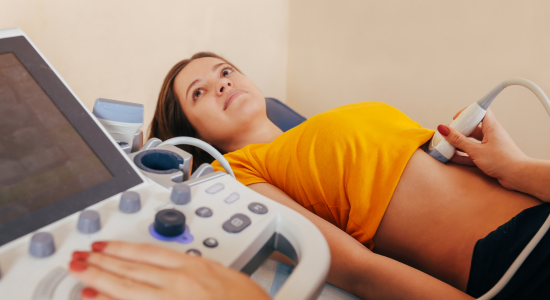*
show full text- Laser treatment of the cervix
- Prenatal care
- Contraceptive methods choosing
- Intimate contour plastic surgery
- Laser gynecology
- Human papilloma virus (HPV) treatment
- Vaginal yeast infection treatment and prevention
- Hysterosalpingographic Evaluation of Uterus and Fallopian Tubes
- Human papillomavirus vaccination
- Genital wart removal
- Treatment of menstrual disorders
- Treatment of adnexitis (pelvic inflammatory desease)
- TREATMENT OF ENDOMETRIAL HYPERPLASIA
- OVARIAN CYST TREATMENT
- TREATMENT OF ENDOMETRIOSIS
- TREATMENT OF SEXUALLY TRANSMITTED DISEASES (STDs)
- ECTOPIC PREGNANCY
- TREATMENT OF UTERINE BLEEDING
- TREATMENT OF HYDROSALPINX
- TREATMENT OF OVARIAN DYSFUNCTION
 Endometrial hyperplasia is the excessive growth of the mucous membrane of the uterus, which consists of endometrial cells. Most often, it develops when hormonal disorders take place. The disease can affect the entire lining of the uterus or certain areas. Depending on the prevalence rate of hyperplasia, the presence of atypical cells and the age of the patient, treatment can be conservative (hormonal drugs) or surgical.
Endometrial hyperplasia is the excessive growth of the mucous membrane of the uterus, which consists of endometrial cells. Most often, it develops when hormonal disorders take place. The disease can affect the entire lining of the uterus or certain areas. Depending on the prevalence rate of hyperplasia, the presence of atypical cells and the age of the patient, treatment can be conservative (hormonal drugs) or surgical.
SYMPTOMS OF ENDOMETRIAL HYPERPLASIA
Endometrial hyperplasia has pronounced symptoms. However, the manifestations of the disease may differ depending on its characteristics.
The main symptoms are:
- disorders of the menstrual cycle (irregularity, the duration of the menstruation more than 5-7 days, heavy discharge);
- bleeding in the middle of the menstrual cycle;
- bleeding during menopause and postmenopause;
- heaviness, aching pain in the lower abdomen;
- pain during and after intercourse.
Severe blood loss can also lead to anemia, which causes chronic fatigue, dizziness and skin pallor.
If the disease originated in progesterone deficiency, women may have general weakness, mood swings, depression, headaches, and weight gain. If there is an excess of estrogen, there may be edema, high blood pressure, high coagulation, mastopathy and other disorders.
CAUSES OF ENDOMETRIAL HYPERPLASIA
During the menstrual cycle, endometrioid tissue goes through a growth and rejection phase. First, under the influence of estrogen, it increases to ensure implantation of the ovum and the development of the embryo. If conception does not occur after ovulation, endometrial cells are rejected, and menstruation begins.
In the second half of the cycle, estrogen production decreases, while progesterone production increases. Impaired hormonal balance and consequently menstrual disorders can cause endometrial hyperplasia.
The likelihood of the disease is increased by:
- hormonal disorders;
- diseases of the endocrine system;
- changes in the functions of endometrial receptors that are sensitive to hormones;
- diseases of the immune system;
- metabolic disease;
- some diseases of the liver and gallbladder;
- obesity;
- absence of pregnancy and childbirth;
- abortion;
- taking some hormonal drugs;
- smoking and alcohol intake.
TYPES OF ENDOMETRIAL HYPERPLASIA
Depending on the structure of the tissues and the shape of the new growth, the following types of the disease are distinguished:
- polyps - separate sites of overgrown endometrium appear on the uterine cavity;
- glandular hyperplasia - the layer-by-layer division of the endometrium disappears, a large number of unevenly located glands of various shapes appear;
- glandular-cystic - cystic formations appear;
- atypical - atypical cells appear in the endometrium.
Also, hyperplasia is divided into different types, according to the area of tissue damage:
- simple - the endometrium grows evenly over the entire surface;
- adenomatous - uneven thickening of the hypertrophied endometrium;
- polypoid - spherical formations up to 1.5 cm in size appear on the endometrium;
- focal - separate pathological zones with a diameter of up to 6 cm are formed on the endometrium.
Some specialists consider adenomatous hyperplasia to be atypical, as it produces cells that are unusual for healthy endometrium.
DIAGNOSIS OF ENDOMETRIAL HYPERPLASIA
During the first consultation, the gynecologist studies the patient’s complaints and conducts an examination on the chair. On the basis of this, the doctor makes a preliminary diagnosis for the confirmation of which laboratory and instrumental tests are required.
The first stage in the diagnosis of endometrial hyperplasia is transvaginal ultrasound. It is performed on certain days of menstrual cycle. The doctor studies the structure and density of the endometrium, checking that they correspond to the norm and the day of the cycle. The study makes it possible to identify deviations, but does not allow to distinguish benign formation from atypical formation.
Histological analysis of a tissue sample is required to determine the type of hyperplasia, in particular the presence of atypical cells. The simplest way to obtain it is considered to be a papel-biopsy. It is a minimally invasive, quick and painless procedure. The gynecologist inserts a tube up to 3 mm in diameter into the uterus and plucks a piece of endometrium with it. Analysis can confirm or disprove a diagnosis, as well as identify atypical cells.
In some cases, additional diagnostics may be needed, such as X-rays or CT scans of the pelvic organs, as well as hysteroscopy with targeted biopsy. This is an endoscopic procedure that makes it possible to examine the uterine cavity, take tissue samples for analysis and, if necessary, remove polyps, altered endometrium or other formations.
Also, for general diagnosis, the doctor may prescribe a bacteriological analysis of the urogenital smear and scraping, general blood and urine tests, blood tests for hormones.
TREATMENT OF ENDOMETRIAL HYPERPLASIA AT «OXFORD MEDICAL»
In the case of hyperplasia, comprehensive treatment is applied, which includes surgical and conservative methods. The obstetrician-gynecologist develops a treatment program, taking into account the age of the patient, reproductive plans and the presence of concomitant diseases.
In most cases, the pathological layer of endometrium is first removed. The procedure is called hysteroscopy - an endoscope is inserted into the womb cavity through the vagina. General or local anesthesia is used. During the operation, the doctor can perform uterine scraping, remove new growths and take a sample of tissue for histological analysis.
In rare cases, women of menopausal age with atypical hyperplasia and other illnesses can be recommended to undergo the removal of the uterus.
Hormone therapy is usually the second stage of treatment. Women of reproductive age are given drugs to normalize the ovarian-menstrual cycle and endocrine profile, as well as to prevent endometrial prolapse. During the pre-menopause period, the doctor may find it more appropriate to speed up the menopause and recommend appropriate medication.
In the case of a minor endometrial lesion, the gynecologist can immediately prescribe hormone therapy. Surgical treatment is also rare in adolescent girls.
Special attention is paid to relieving symptoms and treating concomitant diseases, since hyperplasia often develops in endocrine, autoimmune and other pathologies.
Treatment of hyperplasia is a multi-stage process. It should be conducted by a highly qualified and experienced gynecologist. Precisely such specialists work in «Oxford Medical». The clinic is equipped with new diagnostic and surgical facilities from European countries. It makes it possible to carry out accurate diagnosis of all diseases and to conduct safe, minimally invasive operations.
COMPLICATIONS OF ENDOMETRIAL HYPERPLASIA
Widespread hyperplasia without proper and timely treatment can lead to serious consequences:
- uterine bleeding;
- anemia;
- menstrual disorders;
- infertility;
- malignant tumor.
According to World Health Organization statistics, malignant transformations occur in 30 per cent of patients with atypical hyperplasia and in 5 per cent without atypia. In most cases, the disease is successfully treated with surgical methods and hormonal drugs.
PREVENTION OF ENDOMETRIAL HYPERPLASIA
The development of hyperplasia is associated with other diseases, hormonal and immune disorders. Therefore, for its prevention, it is necessary to maintain the health of not only the reproductive organs, but also of the whole organism.
In order to reduce the risk of illness, it is recommended to maintain a normal endocrine profile, to treat urinary diseases in a timely manner, to visit the gynecologist regularly and to undergo preventive examinations. Early diagnosis provides easier treatment and avoidance of complications.
With a timely visit to a doctor, endometrial hyperplasia is successfully treated. Therapy allows you to get rid of unpleasant symptoms, reduce the risk of complications and preserve fertility.
To make an appointment for a consultation with an obstetrician-gynecologist, call our contact center or write to the chat.
Our EXPERTS
all expertsreviews
department: Gynecology
department: Gynecology
department: Gynecology
department: Gynecology
department: Gynecology
Special offers
current information
Video reviews
A true guarantee of quality and comfortable treatments are thousands of satisfied patients
Glubochitskaya street, 40X
phone:
+38 (044) 204-40-40
show - Viber, Telegram
Pavlovskaya street, 26/41
phone:
+38 (044) 204-40-40
show - Viber, Telegram
st. Predslavinskaya 29
phone:
+38 (044) 204-40-40
show - Viber, Telegram
Bereznyakovskaya street, 30B
phone:
+38 (044) 204-40-40
show - Viber, Telegram
Sribnokilskaya street, 20
phone:
+38 (044) 204-40-40
show - Viber, Telegram
st. Mokra, 20A
phone:
+38 (044) 204-40-40
show - Viber, Telegram
Ivana Kramskogo street, 9
phone:
+38 (044) 204-40-40
show - Viber, Telegram
Obolonska Naberezhna Street 1, building 2
phone:
+38 (044) 204-40-40
show - Viber, Telegram
st. Mikhaila Grishka, 1
phone:
+38 (044) 204-40-40
show - Viber, Telegram
Knyaziv Ostrozskykh street, 46/2
phone:
+38 (044) 204-40-40
+38 (097) 204-84-84 - Viber, Telegram
Mykhaila Dragomirova street, 14B
phone:
+38 (044) 204-40-40
show - Viber, Telegram
телефон:
+38 (044) 204-40-40
+38 (097) 204-84-84 - Viber, WhatsApp, Telegram
Irpen. Universitetskaya street, 2/1; building 3
phone:
+38 (044) 204-40-40
show - Viber, Telegram














